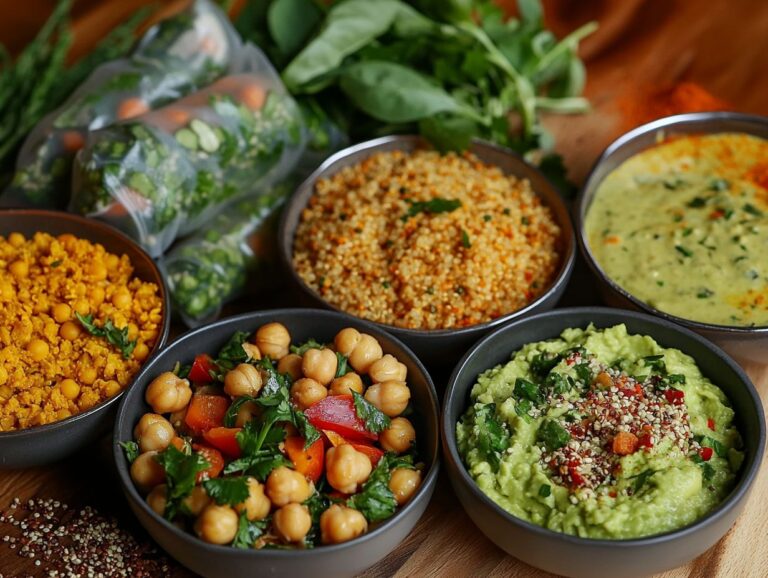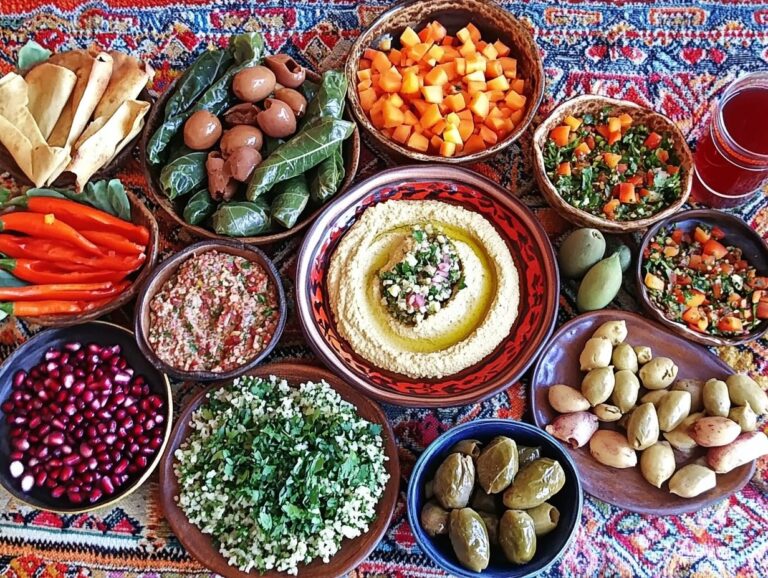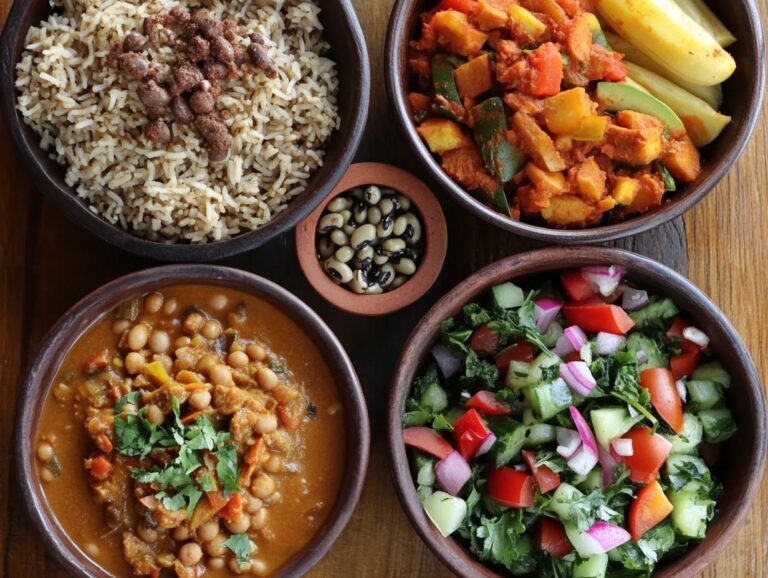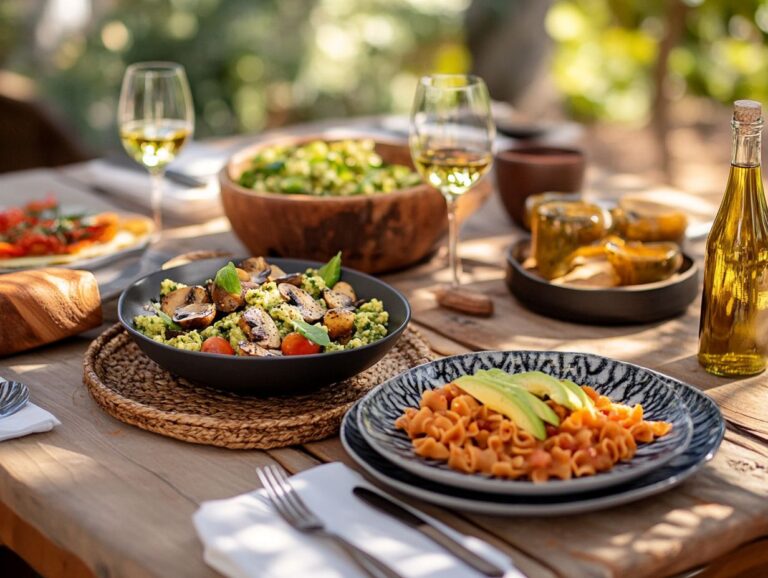If you have been experiencing digestive disturbances, understanding FODMAPs may help you find relief. This article defines FODMAPs, explores their impact on gut health in general, and examines their effects on those following a vegan diet. Additionally, it offers guidance on adopting a vegan FODMAP approach to reduce symptoms and promote a better quality of life. You will find delicious vegan recipes for breakfast, lunch, dinner, and snacks, along with helpful tips for meal planning and substitutions. Enjoy the journey to better gut health with creative and satisfying meals!
What are FODMAPs and How Do They Affect Gut Health and Digestive Health?
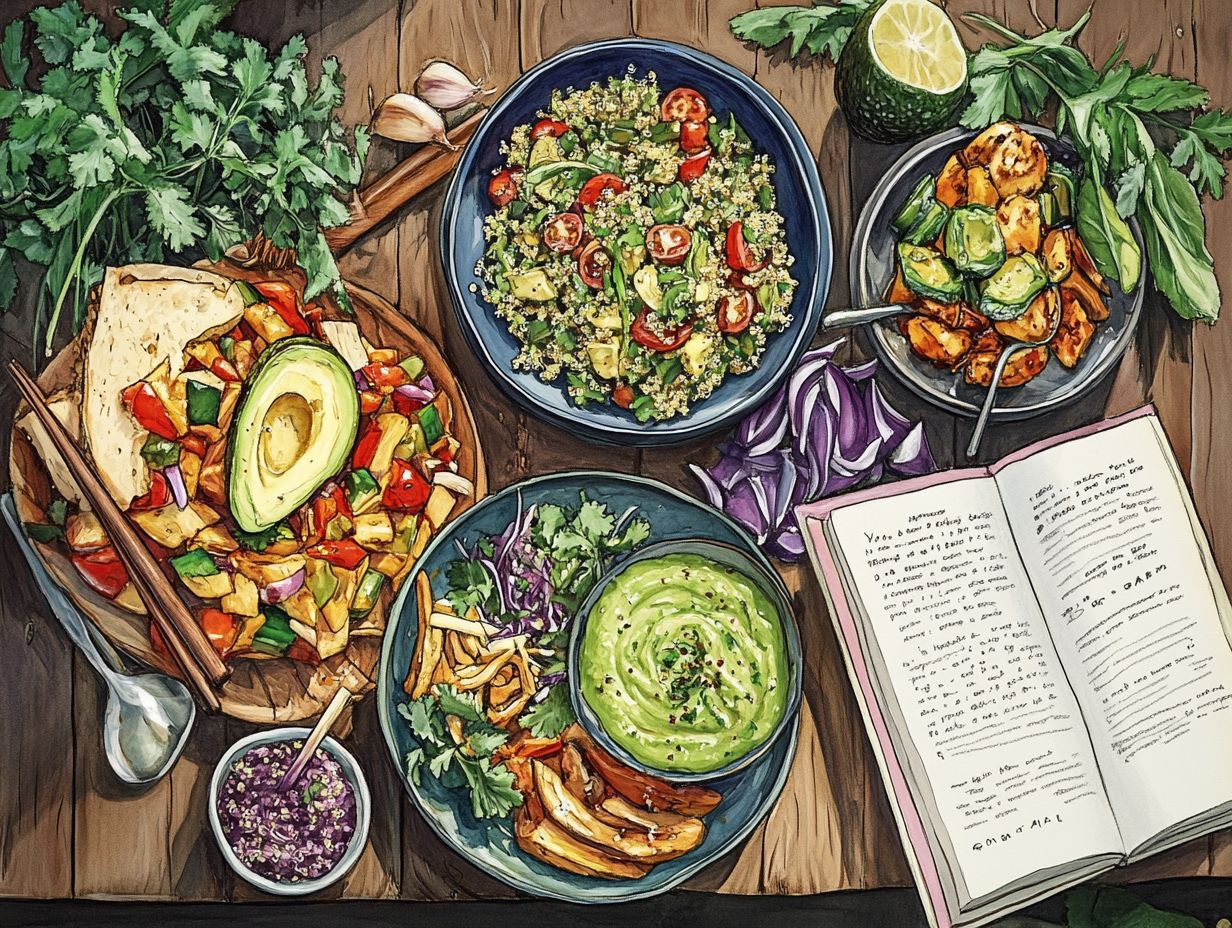
FODMAPs, which stand for fermentable oligosaccharides, disaccharides, monosaccharides, and polyols, are short-chain carbohydrates that significantly impact gut health and digestive health, particularly for individuals with food intolerances like irritable bowel syndrome (IBS) and bloating.
These carbohydrates are present in a variety of foods, including certain fruits, vegetables, and legumes, and can lead to symptoms such as bloating and discomfort when consumed in excess. Understanding the different types of FODMAPs is essential for managing digestive health and supports holistic health by promoting balance in the gut microbiome.
For instance, oligosaccharides found in foods like wheat and garlic are known to ferment in the gut, potentially causing gas and discomfort. Disaccharides, primarily lactose found in dairy products, can pose problems for those who are lactose intolerant. Monosaccharides, especially fructose found in honey and certain fruits, may worsen symptoms in sensitive individuals, while polyols, which are present in sugar-free gum and many stone fruits, can disrupt gut flora.
By distinguishing between high-FODMAP foods, such as onions and legumes, and low-FODMAP options, like carrots and bananas, individuals can better manage their diets to enhance gut microbiome health and alleviate IBS symptoms.
Vegan Diet and FODMAPs
A vegan diet, rich in plant-based foods, can be tailored to fit the low FODMAP diet for individuals with food sensitivities and intolerances.
Those following a vegan low FODMAP diet can enjoy a diverse range of plant-based foods, including high-fiber options such as:
- gluten-free grains
- legumes like lentils and chickpeas
- a variety of vegetables
How a Vegan Diet Can Help with FODMAP Sensitivity
A vegan diet can be beneficial for individuals with FODMAP sensitivity by emphasizing healthy ingredients that support gut health and overall well-being.
This diet typically includes high-fiber foods, healthy fats, and anti-inflammatory components, all of which work together to enhance the gut microbiome, alleviate digestive distress, and promote balanced nutrition.
Vegan FODMAP Recipe Ideas
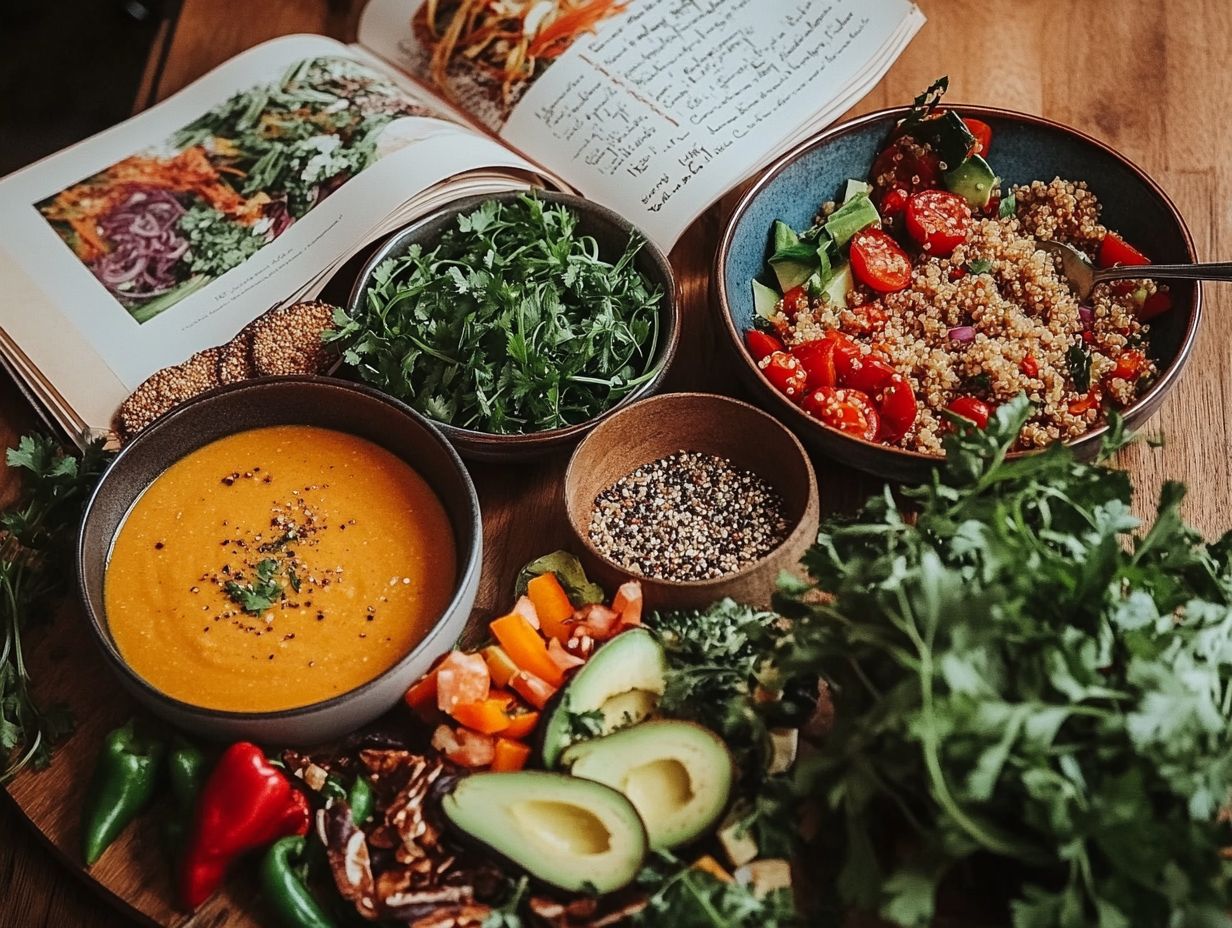
Delicious vegan FODMAP recipes can be created using a variety of fiber-rich, low FODMAP ingredients that are both nutritious and satisfying, providing a balance of nutrients and supporting a wholesome diet.
These easy-to-make vegan FODMAP recipes can incorporate seasonal produce, making meal prep convenient for busy schedules while accommodating diverse dietary preferences.
Breakfast Options
Vegan breakfasts that adhere to low FODMAP guidelines can provide healthy and energizing meals, setting a positive tone for the rest of the day. Incorporating ingredients such as chia seeds, gluten-free oats, and smoothies made with low FODMAP fruits can create balanced meals that support digestion, mindful eating, and overall well-being.
An example of a low FODMAP breakfast is chia seed pudding, which is prepared by combining chia seeds with almond milk and allowing it to sit overnight. This option requires minimal morning prep time and offers a creamy texture that is delightful to eat.
Another choice is quick-cooking gluten-free oatmeal, which can be made with water or lactose-free milk and topped with low FODMAP-friendly fruits like sliced bananas or strawberries.
Smoothies made from spinach, kiwi, and a splash of coconut milk serve as a refreshing and nutritious way to start the day. For meal prep, consider preparing a large batch of oatmeal and storing it in individual containers, making it easy to grab and go throughout the week.
Lunch and Dinner Recipes
For lunch and dinner, a variety of vegan recipes, including vegan protein sources, can be crafted to adhere to low FODMAP guidelines while ensuring that each meal is both nutrient-dense and satisfying.
Ingredients such as quinoa, vegetables, and legumes can be utilized to create hearty, delicious dishes. Experimenting with cooking methods like stir-frying and roasting allows these ingredients to shine.
For instance, stir-frying seasonal vegetables with quinoa results in a quick meal that preserves their nutrients and adds a satisfying crunch. Roasting vegetables enhances their natural sweetness, particularly when paired with herbs like rosemary and thyme or spices such as cumin and smoked paprika.
Incorporating these elements not only enhances the flavor profiles of lunch or dinner but also adds variety and excitement to each bite, making low FODMAP meals enjoyable and fulfilling.
Snack and Dessert Ideas
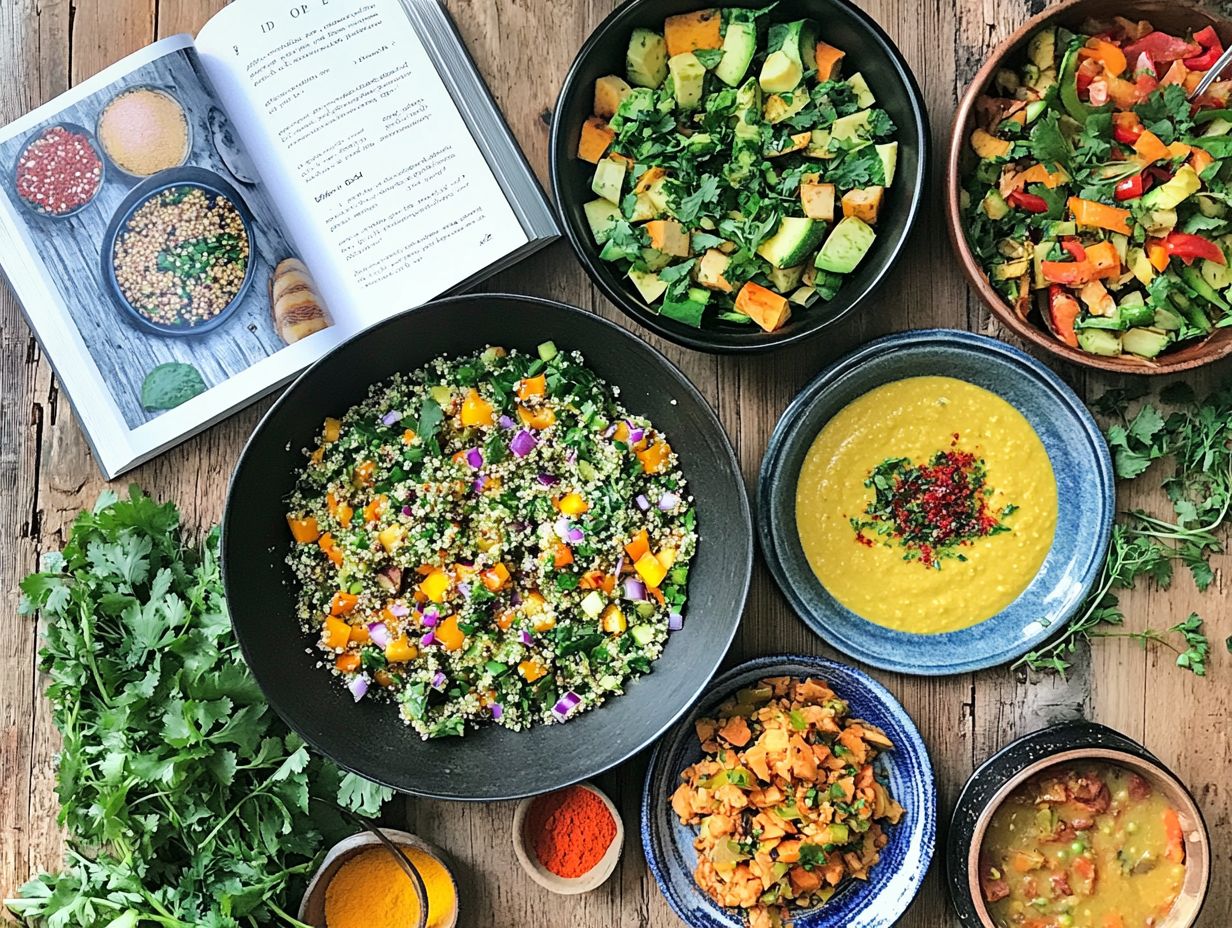
Many vegan snacks and desserts can be easily adapted to fit a low FODMAP diet, allowing you to enjoy delicious foods without upsetting your gut. For instance, coconut yogurt topped with pumpkin seeds and low FODMAP smoothies are both tasty and safe options for those following this dietary plan. These foods can provide essential nutrients and support gut flora while accommodating dietary restrictions.
To expand your snack repertoire, consider making energy balls with gluten-free oats, almond butter, and a small amount of maple syrup. These no-bake snacks are not only delicious but also nutritious.
Another delightful choice is to prepare banana pancakes using ripe bananas, gluten-free flour, and almond milk, which can be enjoyed for breakfast or as an afternoon snack. Incorporating nuts such as almonds and walnuts can add healthy fats to your meals.
Additionally, you can use simple ingredients like chia seeds, dark chocolate, or fresh fruits to create healthy and delicious snacks that provide essential nutrients and vitamins.
Tips for Incorporating Vegan FODMAP Recipes into Your Diet
Effective meal planning and grocery shopping strategies for vegan FODMAP recipes involve understanding which ingredients to prioritize, identifying suitable substitutions and modifications, and creating a balanced menu that ensures a variety of nutritious options. This approach emphasizes clean eating and mindful food combinations for a sustainable and ethical eating lifestyle.
Meal Planning and Grocery Shopping
Meal planning and grocery shopping for a vegan FODMAP diet, which aligns with holistic nutrition principles, necessitate an understanding of which ingredients are beneficial. It is helpful to have a list of vegan low FODMAP ingredients that can be used in various recipes and meals throughout the week, ensuring a focus on balanced diet and food science.
Creating this list will help organize grocery shopping more effectively. If possible, separate the ingredients by seasonal produce sections, such as fruits and vegetables, to ensure they are low FODMAP.
For instance, some seasonal low FODMAP fruits include bananas, while carrots are examples of low FODMAP vegetables. Whole grains like quinoa and rice, as well as protein sources such as firm tofu and lentils, should also be included.
Incorporating a wide variety of ingredients can aid in meal preparation. Batch cooking can save time and provide a diverse range of nutrients; for example, preparing a large batch of vegetable stew or grain salad on the weekend can create exciting leftovers for the week ahead.
Additionally, fresh herbs and spices can enhance flavor and keep meals interesting while promoting a balanced diet.
Substitutions and Modifications
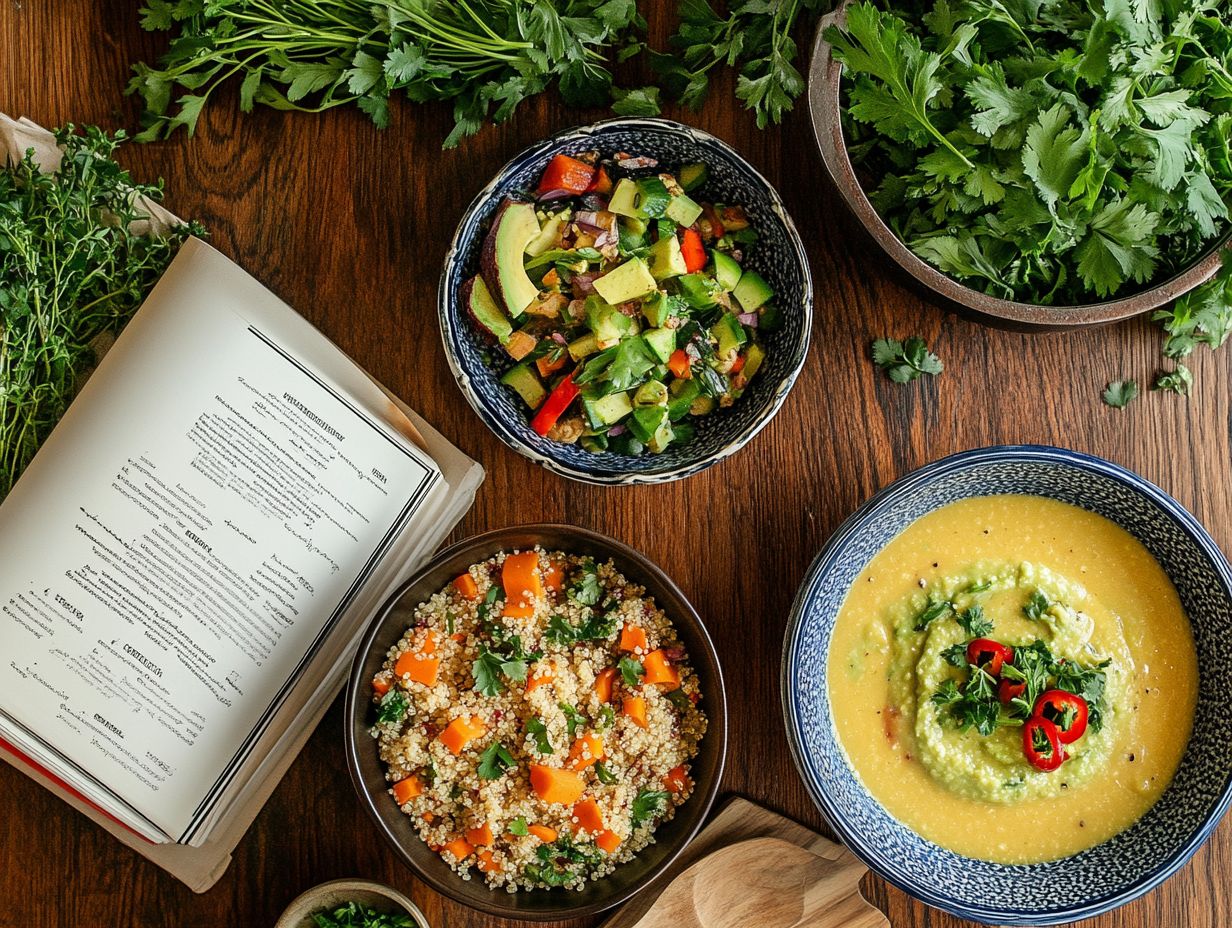
Making the correct substitutions and alterations is essential for successfully adapting vegan recipes to low FODMAP guidelines. This involves finding allergen-friendly alternatives that maintain flavor and nutritional value while avoiding triggers for digestive symptoms. Such ingredient substitutions can lead to exciting food swaps that cater to food allergies and dietary guidelines.
By incorporating low FODMAP options, individuals can enjoy a diverse range of meals without compromising their health. For instance, substituting quinoa or rice for high FODMAP grains like barley or wheat enhances both the texture and nutritional profile of dishes.
Maple syrup or brown sugar can serve as alternatives to honey or high-fructose corn syrup, providing sweetness without causing digestive discomfort. Additionally, garlic can be replaced with infused oils or the aromatic herb chives to achieve similar savory flavors while adhering to dietary restrictions.
Understanding these substitutions is crucial to ensure that each dish remains both delicious and gut-friendly.
Potential Benefits of a Vegan FODMAP Diet
The benefits of a vegan FODMAP diet include improved gut health and reduced symptoms of food intolerances, such as irritable bowel syndrome (IBS). This diet also supports a wellness lifestyle, encouraging healthy eating habits and lifestyle changes.
This diet promotes better digestive function and overall wellness by emphasizing the consumption of plant-based, fiber-rich foods in alignment with holistic health principles.
Improving Gut Health and Reducing Symptoms
Achieving gut health and alleviating symptoms on a vegan FODMAP diet can be enhanced by incorporating probiotics, prebiotics, and digestive enzymes, all of which support a healthy and balanced gut microbiome. Adhering to a low FODMAP diet can help reduce gastrointestinal distress and promote overall well-being, contributing to optimal health and self-care.
Probiotics are live microorganisms that offer health benefits to the host, such as improved digestion and nutrient absorption, when consumed in adequate amounts. These beneficial microorganisms are found in various fermented foods. For example, coconut yogurt is a creamy, dairy-free yogurt alternative that is rich in live cultures and serves as an excellent source of probiotics.
On the other hand, prebiotics are indigestible carbohydrates that act as nutrients for beneficial bacteria and can be found in foods such as ripe bananas and oats. A well-planned vegan FODMAP diet should include a diverse selection of fiber-rich vegetables, such as carrots and spinach, to help maintain a healthy gut lining while providing essential vitamins and minerals. To further enhance gut health, incorporating a balance of probiotics and prebiotics is key, and considering a plant-based approach with wholesome recipes can aid in managing intolerances such as IBS and bloating. Including gluten-free grains, legumes, and fruits in your diet supports digestive health and promotes a balanced microbiome.

